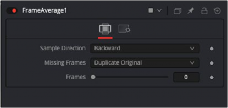< Previous | Contents | Next >
— Full Frames: This forces Frame Processing. Useful for processing frames in a part of a node tree that is otherwise field processing.
— NTSC Fields: This forces NTSC Field Processing. Useful for processing fields in a part of a node tree that is otherwise frame processing.
— PAL Fields: This forces PAL Field Processing. Useful for processing fields in a part of a node tree that is otherwise frame processing.
— PAL Fields (Reversed): This forces PAL-swapped Field Processing.
— NTSC Fields (Reversed): This forces NTSC-swapped Field Processing.
— Auto: This attempts to match the mode of its input images. Fields are used if the input types are mixed.
Common Controls
![]()
The Settings tab in the Inspector is also duplicated in other miscellaneous nodes. These common controls are described in detail at the end of this chapter in “The Common Controls” section.
Frame Average [Avg]

The Frame Average node
Frame Average Node Introduction
The Frame Average node averages together a series of frames to simulate clips shot with long shutter speeds. Aside from motion blur-style effects, it can be useful for time warps or noise removal.
Inputs
The single input on the Frame Average node is used to connect a 2D image that will have the averaging applied.
— Input: The orange input is used for the primary 2D image that will be averaged.
Basic Node Setup
The image connected to the orange input is frame averaged based on the settings in the Inspector.

A Frame Average node blends the input image’s frames.
Inspector

The Frame Average Controls tab
![]()
Controls Tab
The Controls tab contains the parameters for setting the duration and guidance of the averaged frames.
The Sample Direction menu determines if the averaged frames are taken before the current frame, after, or a mix of the two.
— Forward: Averages the number of frames set by the Frames slider after the current frame.
— Both: Averages the number of frames set by the Frames slider, taking frames before and after the current frame.
— Backward: Averages the number of frames set by the Frames slider before the current frame.
This control determines the behavior if a frame is missing from the clip.
— Duplicate Original: Uses the last original frame until a new frame is available.
— Blank Frame: Leaves missing frames blank.
This slider sets the number of frames that are averaged.